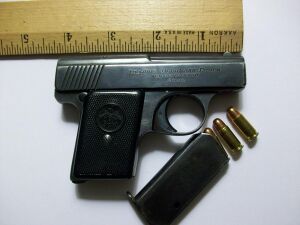Engineering:Liliput pistol
| Liliput 4.25 mm, 6.35 mm | |
|---|---|
 Liliput Model I (.25 ACP) | |
| Type | Pistol |
| Place of origin | Weimar Republic |
| Production history | |
| Manufacturer | August Menz |
| Variants | 2 |
| Specifications | |
| Cartridge | 4.25mm Liliput, .25 ACP, .32 ACP |
| Calibre | 4.25 mm (.167 in), .25 in (6.35 mm) |
| Action | Blowback |
The 4.25 mm Liliput pistol is one of the smallest semiautomatic handguns ever made (the Kolibri is generally considered the smallest). Hence its name, derived from the fictional island of Lilliput, inhabited by tiny people.
The Liliput was manufactured by Waffenfabrik August Menz in Suhl, Germany from approximately 1920 to 1927. Menz also manufactured a similar .25 ACP pistol introduced in 1925 as the Model 1, and a .32 ACP pistol sold as the Beholla Pistol. Overall length of the Liliput was 4.25 inches and barrel length was 13⁄4 inches.
Because the pistol uses a 4.25 mm (.167 in) cartridge (which became known as the 4.25mm Liliput and which is considered obsolete), the Liliput is one of the few pistols that can be owned in the United Kingdom without a license.[1]
The Liliput features in a number of novels by Alistair MacLean, though he incorrectly calls it the "Luger Liliput" and refers to its calibre as ".21".
See also
References
- ↑ Firearms Law, Guidance to the Police. Home Office/HMSO London, 2002. Appendix 5, Antique Firearms: Obsolete Calibres
External links
- Pictures of the 4.5 mm Liliput cartridge, compared to the Kolibri rounds.
- Pictures of Hitler's golden Liliput.
- Menz Liliput 4.25mm
